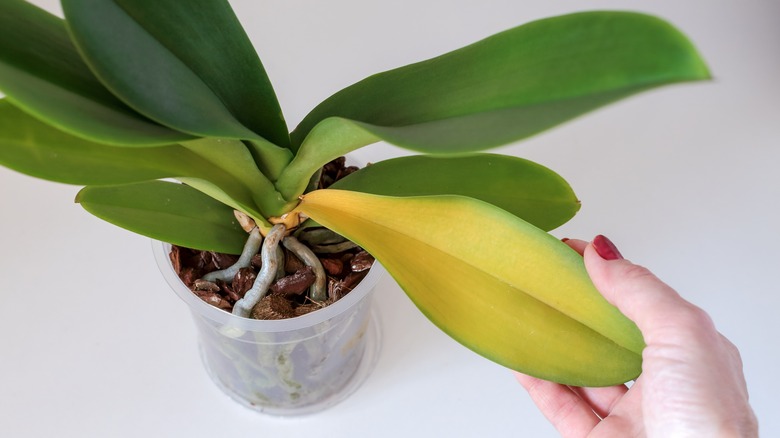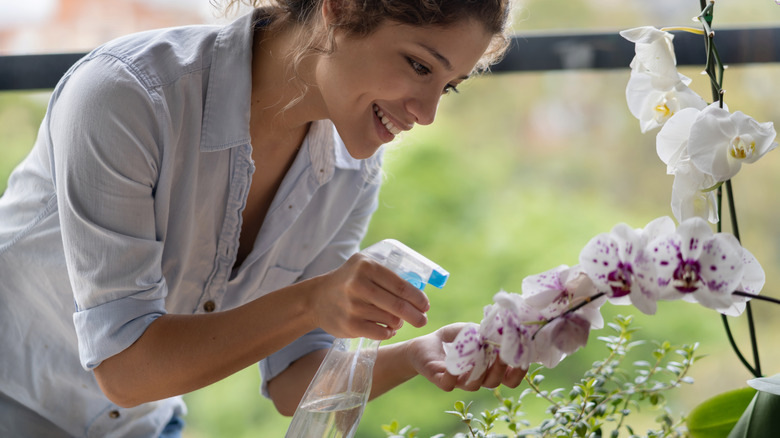Martha Stewart's Clever Tips Make Reviving A Dying Orchid Easier Than Ever
While orchids are common houseplants, they can be surprisingly tricky to care for. If you've ever bought or received an orchid as a gift, you were probably mesmerized at first by its stunning blooms. But after just a few weeks, many orchid blooms wither away, leaving behind a basic plant with rubbery green leaves. "No problem," you might think, "Even when they aren't blooming, orchids can still look charming on a desk or bookshelf." But before you know it, the orchid's leaves start yellowing, drooping, or wrinkling, and the plant just doesn't look so cute anymore. What gives? Leave it to Martha Stewart to show all of us the right way to care for an orchid.
"The key to growing these plants is to keep the root systems strong and healthy. These plants have no bulbs or stems to store moisture and nutrients, so it is important to maintain their roots," Stewart wrote on The Martha Blog. While too much tinkering can be bad for orchids, ignoring them completely may be the biggest blunder — especially if you neglect their pots. To demonstrate her point about proper root care, Stewart shared a TikTok video showing how to repot an orchid plant, plus some handy tips for watering and more.
Orchids need space to breathe
The pots that orchids come in are often too small, and many lack the proper drainage and aeration needed for the plants to thrive. A tiny, poreless pot traps too much water against the roots. Martha Stewart recommends transferring your orchids to a specialized pot that's slightly larger than the one the plant came in. In her TikTok video, Stewart gently pulls a Lady Slipper orchid out of its tiny pot, then uses her hands to remove the old dirt, moss, and debris. She explains that the ideal pot should have holes all around the sides so that the roots have room to breathe and grow. Moving the orchid to a pot that's 2 inches larger than the previous one will provide enough room for about two years of growth.
In the video, Stewart scoops up a mixture of orchid substrate and lists off its components. "This is Canadian sphagnum moss, peat moss chunks, charcoal, orchid bark, and lava rock. It is very good for orchid propagation." If you prefer a more eco-friendly substrate, you can use almost anything light and bouncy, such as coco coir or PittMoss peat moss alternative. She adds the orchid into the new pot and scoops in some of the substrate to secure it, loosely spreading it around the plant without squishing down. Finally, Stewart follows up with some plush green moss to hide the substrate and give the orchid a healthy green glow.
Keeping your orchids happy and healthy
Most orchids are epiphytes, also known as "air plants." In nature, orchids typically cling to tree bark, branches, and rocks. Rather than sending roots down into the earth, they collect moisture from the air or trickling raindrops. "When watering, it should be thorough and the medium should be dry at least half way through before watering again," Martha Stewart wrote on The Martha Blog. In her TikTok video, she elaborated, "Mist the leaves and it feeds through the leaves, and then water every five days or so. Simple, but it will save your orchid."
Transfering your orchid to the right pot and substrate will help it survive, but what is Stewart's advice for getting the orchid to bloom again? You can't force a plant to bloom, but a happy, healthy plant is much more likely to flower. It all comes down to the right environmental combination. As Stewart wrote on her blog, "Rule of thumb — orchids that receive a proper balance of light, humidity, and temperature will have healthy bright green leaves. Too little light would make the leaves very dark." To give your orchids an extra boost, she also recommends using a gentle fertilizer or special orchid mist infused with nutrients like marine plant extracts, humic acid, and fulvic acid.

